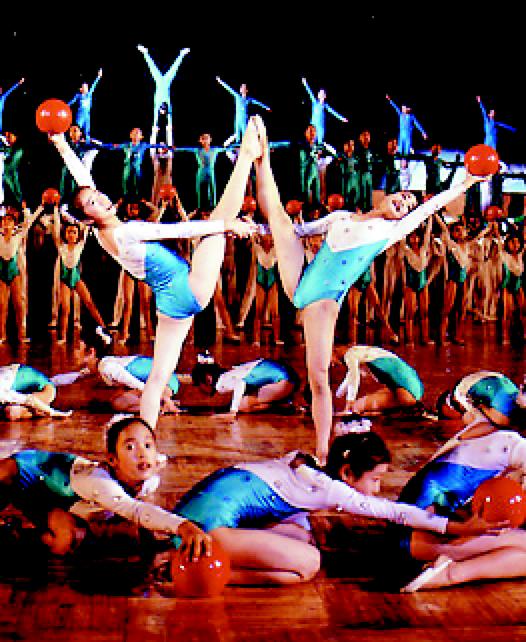In 2003, BBC documentarian Daniel Gordon was granted unprecedented access to the People's Democratic Republic of Korea to cover a rather unique sporting event known as Mass Games. Designed by now-dead “Eternal President” Kim Il-Sung as a way to, um, “indoctrinate” citizens into the principles of Communism, the Mass Games are a patriotic rhythmic gymnastic spectacle held on a gargantuan scale.
While thousands of teen and preteen athletes perform roller boogie numbers in perfect lockstep unison, stadiums full of youngsters with flipcards create massive moving mosaics depicting the country's glorious history. It's like a Super Bowl half-time show on steroids. Or 1984 as designed by Busby Berkeley.
The idea is to get the citizens of North Korea (or “Korea,” as they call it) to act as one single-minded, unibodied organism. The individual does not exist in the grand vision of Kim Il-Sung (or in the mind of his puffed-up toad of a son Generalissimo Kim Il-Jong). All that exists is the united will of the people (as meticulously prescribed by their dictatorial leader).
A State of Mind isn't exactly a probing documentary. But then it doesn't need to be. Images out of North Korea are so rare that any glimpse behind that bamboo curtain is fantastically eye-opening.
The film mostly follows two young girls, 13-year-old Pak Hyon Sun and 11-year-old Kim Song Yun, as they practice up to 10 hours a day for nearly the whole of 2003 to perform in the Mass Games. The one and only dream these girls have is to toss small rubber balls up in the air for the glory and delight of Kim Il-Jong.
None of Gordon's footage was censored, most likely because the Korean government is hugely proud of its nation as a whole and of the Games in particular. But there really is no better image of the nation than this beautiful and creepy spectacle of synchronized hero worship. You can almost see Karl Rove salivating at the prospect.
In interviewing the girls and their families, Gordon captures an amazing shapshot of life inside the planet's last Communist stronghold. (China and Cuba, it must be noted, look like Grateful Dead concerts compared to the rigid conformity of North Korea.) Every morning at 7 a.m. the “Worker's Alarm” sounds, and the entire country wakes up. Homes are equipped with “state sponsored” radios that do not have an off switch. Each person is allocated one chicken and five eggs each month to eat. In schools, the rhetoric is simple: Us versus them. “Them” being the evil imperialists known as the USA.
Amid all the determination, jingoism and sheer strength of will these people demonstrate, there is an unspoken sadness. Clearly, the country is suffering under the weight of its convictions. Malnutrition is common, rolling blackouts happen almost every night. Despite their overwhelming dedication to total self-reliance, the people schizophrenically blame all their troubles on the evil imperialists in America for not providing economic aid. North Korea's entire system of cartoonish, Technicolor politics seems as quaintly outdated as Disneyland's “It's a Small World” exhibit.
With government watchdogs shadowing it every step of the way, A State of Mind never really digs around for an alternative point of view. (Surely, there are a few Koreans who think Mass Games are dorky as all get-out.) Even so, the rose-tinted image that the government officially endorses is an enlightening one. You can't argue much with the results: There are no “blue states” in Korea. And it's hard to find fault with the belief that America harbors secret dreams of imperialism–especially when it's busy poking its nose into the Middle East. But you have to wonder about the foreign minds that firmly believe American people are quaking in their boots at the thought of 10,000 prepubescent girls waving flags in unison.



